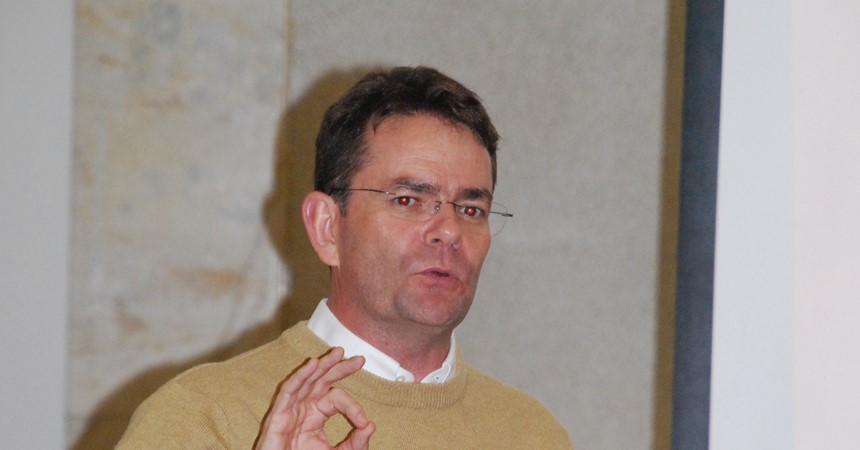In a world ‘hell bent on retribution and revenge’, Richard applauded the wonderful initiative of Pope Francis to inaugurate a Year of Mercy, reminding us of the three ancient Jubilee year obligations: to set prisoners free, forgive debts and tangibly respect the environment. His exploration of forgiveness touched participants deeply. Hypocrisy and failure to forgive, he affirmed, are the two gospel sins with which Jesus was concerned. Yet, always realistic, Richard acknowledged the difficulty of being a forgiving people, pointing to his founder, Ignatius, who wisely said that we need to ask for the grace to WANT to forgive! Again drawing from his founder’s advice, Richard suggested it could be a valuable exercise in this Year of Mercy to make a list of those people – alive or dead – to whom, when we hear their name, we have a visceral response! People we have not yet forgiven….those still holding us in the prison of resentment? If so, we need to be set free (and set them free) in order to have closure. What food for our prayer, if we are to embody and bear witness to God’s compassion! One participant reflecting on the day named this as its most important insight: ‘learning that forgiveness is a strength, not a weakness’.
Richard affirmed the whole point of this Year as being to renew our sense of mission – but not be overwhelmed by it. Pope Francis, he notes, keeps calling us back to a personal response, inviting us to find our way of responding to Matthew’s Great Commission – to go out to all the world (Mt 28). If each of us did one thing, the world could be changed. We can’t take on the lot. This is where Richard excelled, pointing us forward. First of all we need to know our world. What are its questions? Are we alert to the critique of others about faith and religion and able to respond? Are sceptics just ‘cherry picking’ their information; selectively using scripture, for example, for their own ends? Are we equipped with facts so that we can also critique what is not of truth: clear about ‘where I’ve come from, why I’m here, and where I am going’. A tall order! Richard drew upon census information, surveys and his own awareness of the searching of young people, impelling us, as he does, to engage with, not retreat from, society. People’s search for meaning matters; people’s feelings are highly significant. We need to be where they are, ready to engage. If we don’t know the world to which we are called to ‘go out’, ‘we could be in strife’: the world as it is, not how we want it to be!
Integral to this, Richard insisted, is our image of God. We could laugh when shown a section of Bruce Almighty, but were reminded that this is still the image of God for many; Zeus, the tough one who needs to be kept on side - as distinct from the merciful and compassionate God of Jesus Christ.
Richard was clear that our day was not to be an easy ride. Proclaiming mercy and compassion is intertwined with living justly, and whatever that demands. Our witness in the world is the greatest indication of compassion. As Francis has said, we are a church of the poor, and that may cost us everything, as was strikingly evident in Romero - his point of conversion being the realisation that he needed to speak out against structural injustice. And that did, indeed, cost him everything.
Consistent with this, Richard began the day acknowledging the courage of the people of Maitland–Newcastle in the face of the institutional effects of the scandal of child sexual abuse. Later this particular face of the Church – one we would prefer to avoid – was explored in more detail, visually grounded in the recent Oscar-winning Spotlight. As Richard maintained, the costs of this scandal will indeed continue to demand much of us. Necessarily so, if we are to embody gospel justice and mercy for those who have suffered so acutely.
As I write this at the end of the day, Four Corners is about to reveal an appalling glimpse into the imprisonment of NT children. According to the previews it could be easy to turn off the set because it is too hard. Richard warned us that some of today’s film clips would be hard to watch. But that was one of our key challenges – and is increasingly important in our trauma-ridden news telecasts. I can imagine deep anger will be evoked tonight. Yet this is possibly a glimpse into part of our culture which needs to be watched, needs to be gut-wrenching, because then we might be inspired to do at least one thing to make a difference. Otherwise days such as this are of little value – just another seminar. Years such as this one pass us by. But as Richard asserted, referring to a film viewed at the Mercy International Centre in Dublin, ‘Mercy has to keep going because mercy is at the heart of God’. What we heard today is, as Richard concluded, essential, not just for this year (of mercy) but every year – lived with our head, heart and gut.
Thanks to Sr Maureen Salmon and TWEC for this rich formation opportunity, enabling us to engage with one of Australia’s most reputable and grounded pastoral theologians. Participants were grateful for Richard’s clarity, down to earth approach, ability to communicate something serious – both easily and with humour. No longer will movies be perceived as mere entertainment, for they, too, are voices of our time to which we may well attend. In this regard Richard generously offered a selection of 20 film titles, reflective of mercy: a feast for parishes if some or many could be shown during what remains of 2016.[1] They have the potential to do what Richard did with us: fire imagination, evoke feeling, present us with stories of inspiring witness and move us to respond, perhaps more courageously and freely into deeper encounter with the people of our time – to whom we are unequivocally sent on mission.
[1] Harry Potter, Hotel Rwanda, The Hurricane, Jesus of Montreal, The Last Days (Spielberg), The Lives of Others, Lord of the Rings, Lourdes, Millions (about saints), Molokai, The Name of the Rose, Of Gods and Men, Romero, Shawshank Redemption, The Truman Show, The Visitor, The Way, Whale Rider, Witness, The Mission.

